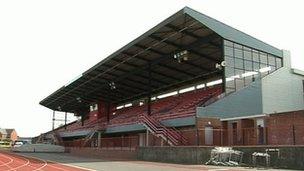Cwmbran Stadium has licence suspended by UK Athletics
- Published

The grandstand has been condemned and the track is now deemed unsuitable
A stadium once graced by some of British athletics' top names has had its licence suspended because of its poor condition.
But Torfaen council say it is confident it can reverse the decision by UK Athletics (UKA) on Cwmbran Stadium.
It was the first step on the road to stardom for the likes of Olympic long jump gold medallist Lynn "The Leap" Davies, and hurdler Colin Jackson.
However, UKA says it is no longer safe despite a £5.6m revamp in 2002.
The grandstand was condemned last year, and UKA said the track now posed an unacceptable risk to competitors.
A UKA spokesman said officials met the council last March "and told them that unless repair work was done we would have no choice but to act, and sadly that's what's happened".
"Over the past few years it's been flagged up that the track has deteriorated significantly, and it's now got to a point where it's no longer viable to meet the requirements of UK certification."
Torfaen council estimates that the cost of restoring the track at no more than £15,000, and insists that despite financial constraints, it is striving to secure the necessary finance.
Training nights
Lewis Jones, the council's deputy leader, said: "While we were disappointed to have the UKA certificate withdrawn, as it has only been suspended, UKA have confirmed that it will be reinstated if we are able to fund the required work."
"We will investigate costs of the required repair work and various funding routes to make this possible, but in the meantime we were very pleased that the track still meets training requirements."
"This means that young athletes from Torfaen, including those from the successful Cwmbran Harriers, will still be able to train regularly in their home borough.
"We have liaised with the club and we will agree on a number of risk assessments that will allow training nights to carry on with minimal disruption."
Yet for Lynn Davies - who won Olympic long jump gold in 1964 and who is now president of UK Athletics - the news represents an extraordinary backwards step in less than 10 years.
"It makes no sense. When it was announced that the Olympics were coming to London, Cwmbran hadn't long had a refit and we were all optimistic about it being the focal point of capitalising on the Olympic legacy in south Wales."
"But for the sake of a comparatively tiny amount of money it's been allowed to decay, and the chance to really build on the enthusiasm of the games seems to have been lost."
"There are athletics clubs across the country with waiting lists of up to 200 children keen to take up sport, but we are now in a position where facilities are disappearing and these youngsters have nowhere to go."
Adrian Snelgrove, a former captain of the Great Britain blind football team, used the stadium for conditioning training ahead of both world championships and Paralympics.
"Coming from Tredegar, it was incredible to have a facility like that on my doorstep, but you could tell it was in trouble quite a long time ago," he said.
He added that the stadium had "fantastically knowledgeable and helpful staff," but they needed backing "to make a proper go of it".
- Published5 July 2011
- Published24 August 2010